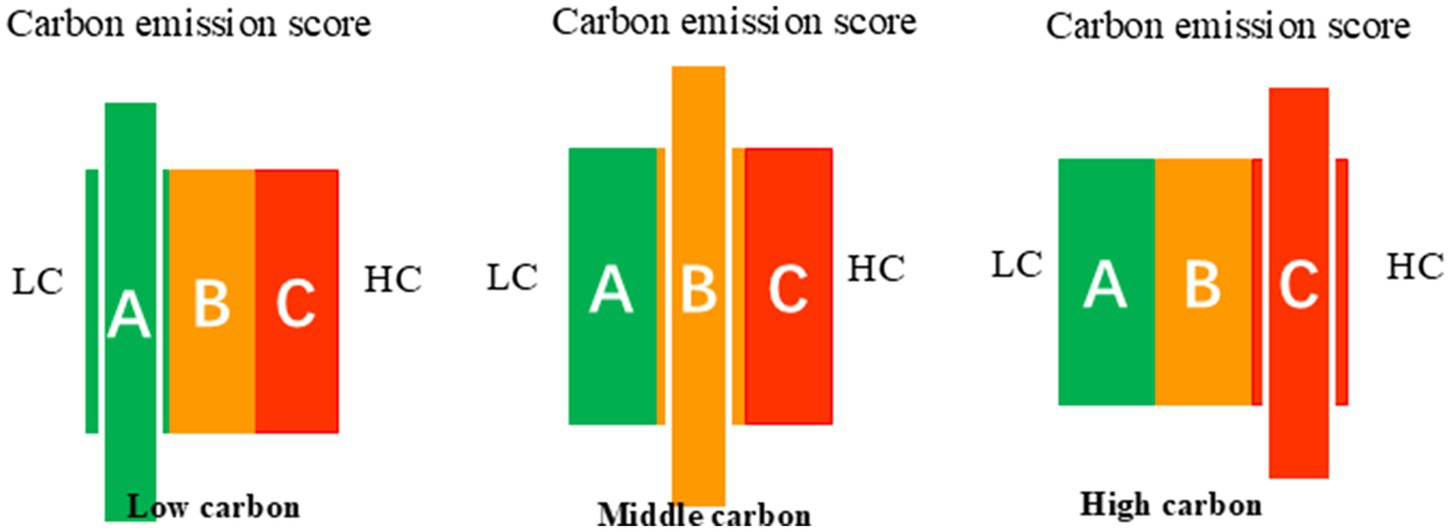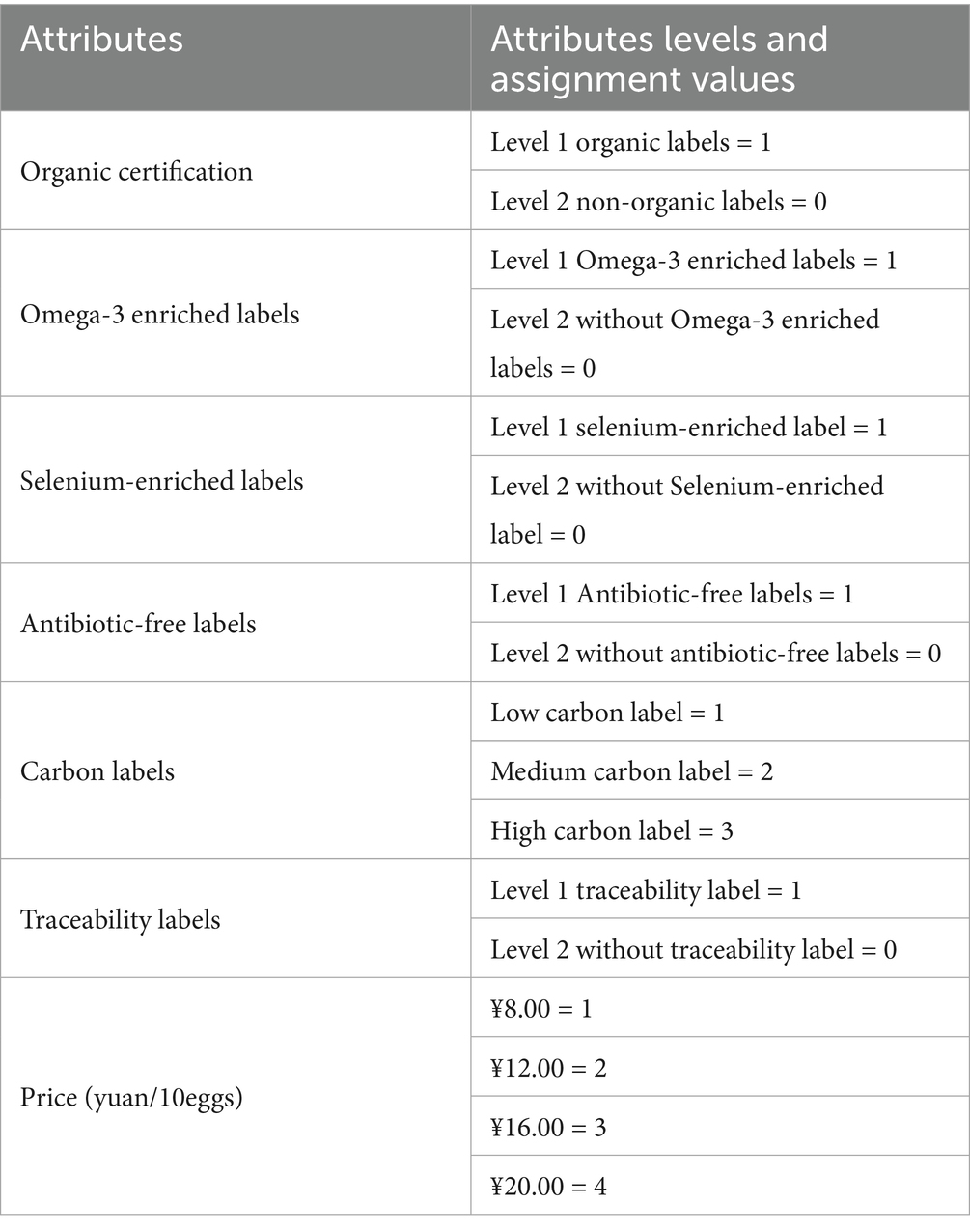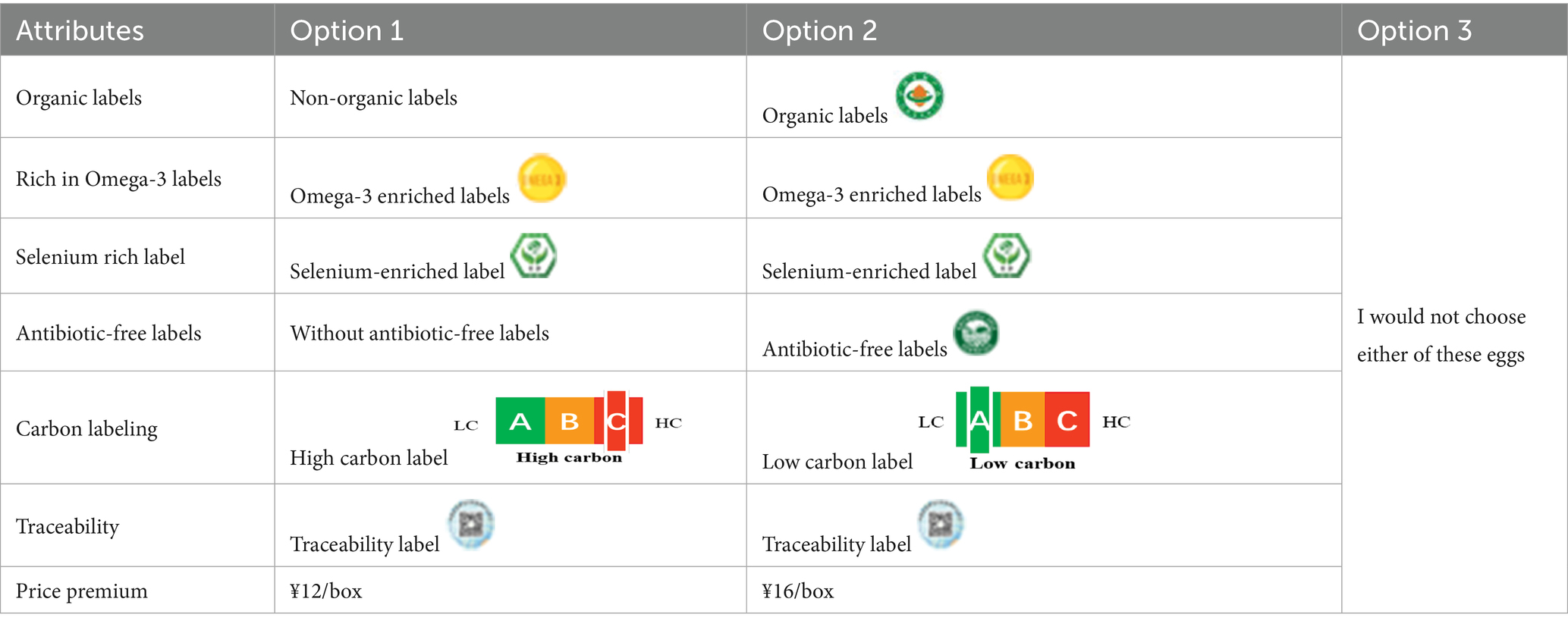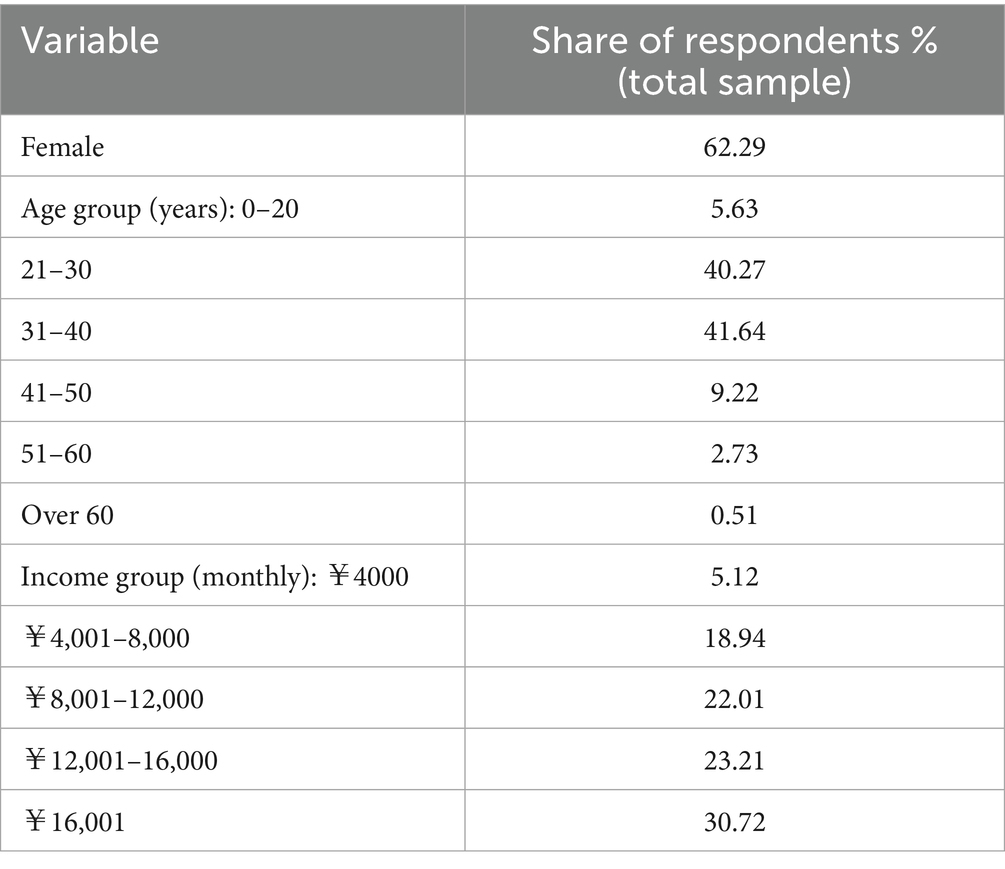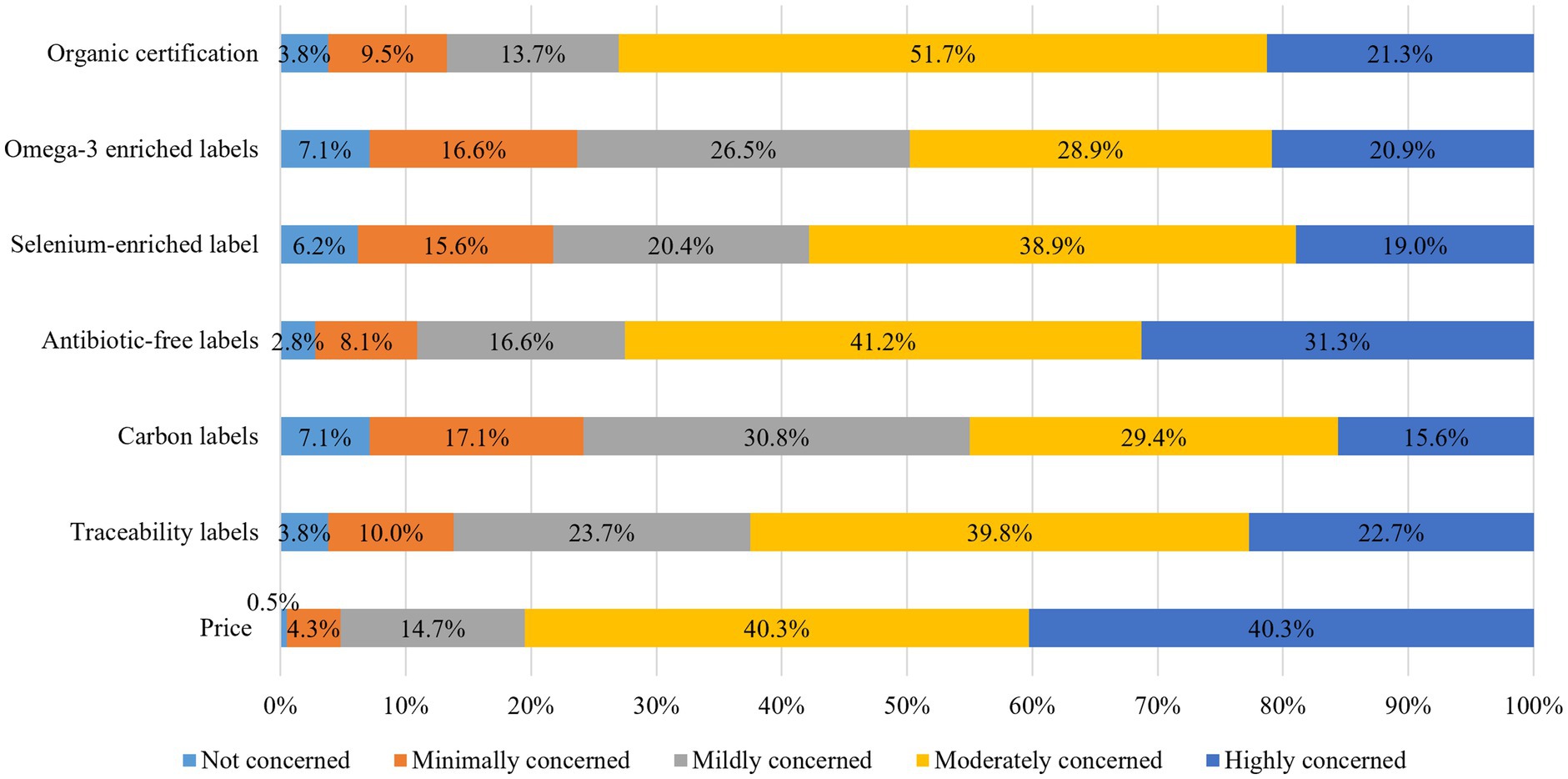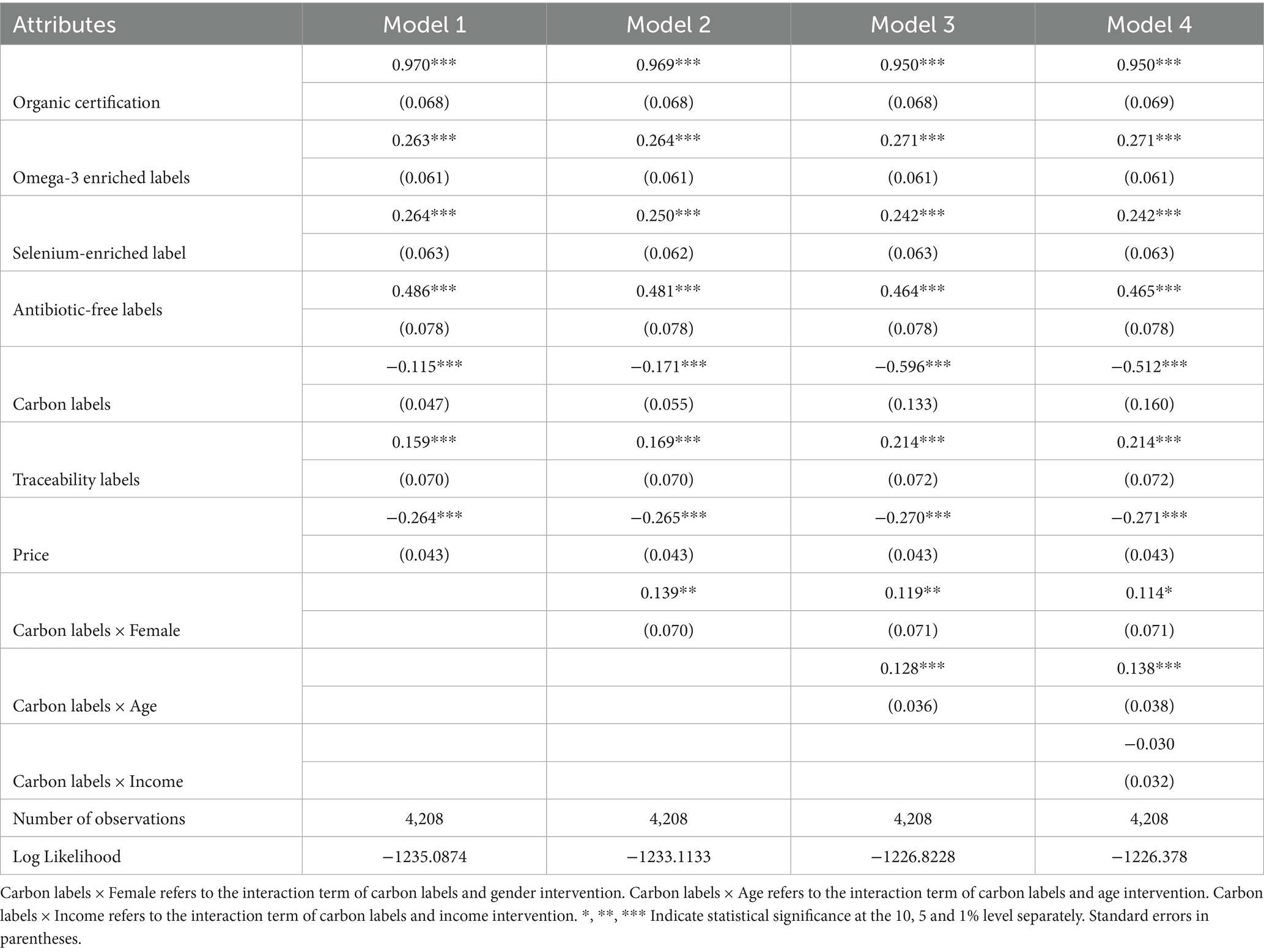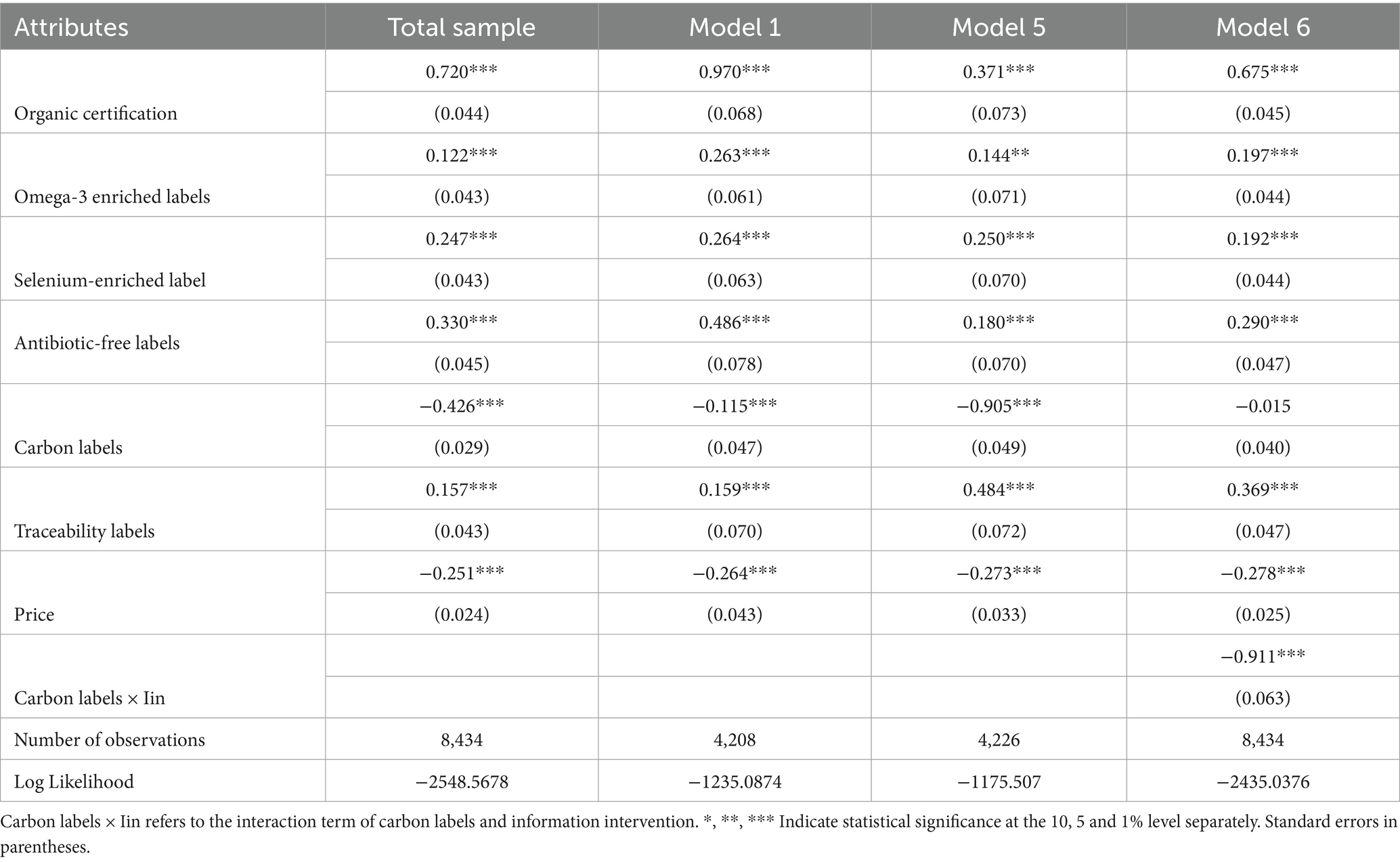- Lingnan Normal University, Zhanjiang, China
This study aimed to investigate Chinese consumer preferences and willingness to pay for carbon-labeled eggs, and to explore the heterogeneity of consumer preferences and willingness to pay under different information interventions. A choice experiment was conducted to investigate consumer preferences for food quality attributes, and the survey data was analyzed utilizing a mixed logit model. The findings revealed that Chinese consumers prioritize eggs with organic certification and antibiotics-free labels. Additionally, Chinese consumers exhibit a positive willingness to pay for carbon-labeled eggs, however, the attribute of carbon labels is perceived as the least important among all attributes by consumers. In addition, the preference for carbon-labeled eggs exhibits heterogeneity, with female and young consumers demonstrating a greater willingness to pay a premium. The provision of information regarding global warming and the significance of carbon labels enhances consumers’ inclination to pay a premium for products with carbon labels.
1 Introduction
To address global warming, many countries have actively promoted environmentally sustainable and low-carbon development as a key strategy (Foxon, 2011). It entails consumers evaluating environmental attributes and selecting sustainable products (e.g., low-carbon alternatives) during purchasing decisions (Peattie, 2010). The carbon label serves as a distinguishing marker enabling consumers to discern lower carbon products (Li et al., 2017). It is an important policy tool for energy conservation and emission reduction recognized internationally. Since the carbon label system was first introduced in 2007, more than 50 countries around the world have carried out practices in some products such as food and electronic products. A well-established low-carbon labeling system can promote the low-carbon transformation. On the one hand, carbon labels can provide consumers with information on carbon emissions of a product, thereby promoting environmentally-friendly purchasing behaviors (Holenweger et al., 2023; Lohmann et al., 2022) and fostering an environmentally friendly consumption culture. On the other hand, carbon labels can guide enterprise to conduct carbon footprint calculations and implement energy-saving technological renovations to form the driving force for emission reduction throughout the entire industrial chain (Nguyen-Viet, 2022; Xu and Lin, 2021). Especially under the strategic background of China’s proposal of the “dual carbon” goals, the low-carbon transformation in the agricultural sector is particularly urgent. Agriculture constitutes a major contributor to global greenhouse gas emissions, accounting for approximately 16–27% of anthropogenic emissions worldwide (IPCC, 2019). Among them, animal-derived foods, especially livestock production, account for a considerable proportion. However, obtaining carbon label certification will increase production costs, the sustainability of the implementation of carbon labeling food largely depends on whether consumers are willing to pay a premium for such products. Hence, it is of utmost significance to explore consumer’s willingness to pay for carbon labeling food.
Extensive scholarly work has examined consumer preferences and willingness to pay for carbon-labeled food products. Most studies have pointed out that consumers exhibit systematically lower willingness-to-pay for carbon-labeled products (Rondoni and Grasso, 2021). When presented with a distinct carbon label, consumers exhibit a willingness to pay a premium for low-carbon food products (Grebitus et al., 2015). However, compared with the ecological and environmental information related to carbon labels, consumers demonstrate stronger willingness-to-pay premiums for labels with nutrition and health information such as organic certification or antibiotic-free certification (Thøgersen and Nielsen, 2016; Zhao et al., 2018; Lampert et al., 2017). And existing research indicates that consumer preferences for carbon footprint labels exhibit significant heterogeneity across food categories. Among these food categories, they are mostly concentrated in three major categories, including processed foods, staple agricultural commodities and cash crops. For example, Italian consumers command a 30% price premium for carbon-labeled fresh milk but demonstrate significantly attenuated premiums for carbon-labeled chocolate bars (Owusu-Sekyere et al., 2019); Chinese consumers command a price premium of 25.66, 31.96, 24.08, 23.62 and 20.64% for carbon-labeled milk, corn, bananas, tomatoes, and eggs (Xu and Lin, 2022). In these studies, the carbon-labeled egg category mostly exists as a secondary analysis, lacking in-depth focus. However, eggs are the second largest source of animal protein for global consumption. Egg-laying poultry farming contributes 15–30% of agricultural carbon emissions, and there is huge potential for emission reduction. Therefore, the research on the preference for carbon-labeled eggs warrants scholarly attention. In addition, existing research indicates that demographic factors such as gender, age, education level and income can affect consumer preference and willingness to pay for carbon-labeled food products. The internal motivation can be partly attributed to the group differences in environmental awareness. However, environmental awareness may be intervened and regulated by external environmental messaging (Wong and Lai, 2024). Then, when environmental messaging is intervened as a situational cue, does it significantly alter consumer preference for carbon-labeled eggs? Current literature lacks empirical validation and boundary conditions regulatory mechanism, constraining carbon label policy precision.
Current research on egg preferences mainly focuses on organic eggs, animal welfare, nutritional components, geographical origin, eggshell color, and other factors that affect egg preferences and willingness to pay. Among the factors related to nutrition and health, a consumer survey conducted in Turkey revealed that individuals with personal interests exhibit a higher inclination toward purchasing eggs labeled as organic compared to those with collective interests (Güney and Giraldo, 2019). Tian et al. (2022) have substantiated that Chinese consumers exhibit a greater willingness to incur a higher premium for nutrient-fortified eggs in comparison to conventional eggs. Similarly, Yeh et al. (2020) have confirmed the inclination of health-conscious purchasers in Italy and Hungary to pay an elevated price for Omega3 nutritional health claim labels. Among ecological ethical factors, through conducting a consumer survey in Brazil and Chile, Yildirim et al. (2018) revealed that consumers’ primary concerns when purchasing eggs are centered around animal welfare, naturalness, hygiene, and ethics, as these aspects are intricately linked to enhancing egg health, nutritional composition, and flavor profile. Bett et al. (2013) surveyed Kenyan consumers and discovered that there is a stronger inclination toward locally produced eggs, resulting in a willingness to pay an additional 41.53% for such eggs, Gracia et al. (2013) also confirmed this result. Among the sensory factors, the study conducted by Berkhoff et al. (2020) revealed that Chilean consumers consistently rated farm eggs with brown or blue shells higher in terms of sensory evaluation compared to free-range and caged white-shell eggs. Nutritional elements are also important indicators affecting consumers’ preference for eggs. However, limited research has been conducted on consumer preferences regarding carbon-labeled eggs. Liu et al. (2022) investigated consumer preferences for eggs to eco-labeling and found that Chinese consumers exhibit a willingness to pay a higher premium for eggs labeled as “organic,” “free-range,” and “nutrient-rich.” However, the study did not address the inclusion of carbon labeling within the context of eco-labeling. Whether carbon label information can break through the “cognitive masking” of other factors on low-priced and high-frequency consumer goods like eggs is a question worth studying.
Overall, the study aims to address the following research questions: (1) what is consumers’ preference for egg? (2) Are they willing to pay a premium price for carbon-labeled eggs compared with other attributes? (3) What demographic factors affect consumer’s preference for carbon label? (4) When environmental protection information input is intervened as a situational variable, can it reshape consumer’s preference? In 2022, China became the world’s largest producer with an astonishing output of 29.4 million tons, accounting for approximately 33% of the global total output. China has a huge egg consumption market, so Chinese consumers are worthy of study. By conducting a choice experiment in China and analyzing consumers’ willing to pay for carbon labels, this research contributes to existing research on consumer preference and carbon-labeled food productions. It expands the scope of the egg preferences study by providing insights into consumer preference for carbon-labeled egg. And it enriches carbon-labeled food products research within the context of China. Comparative analyses with other labels and attributes can help identify the specific aspects of consumer preference.
2 Materials and methods
2.1 Survey design
The choice experiment method is a survey technique that employs the orthogonal design principle to create a range of products for consumer choice. Prudent attributes and product levels selections constitutes the methodological foundation for designing discrete choice experiments. Prior research establishes nutritional safety attributes (e.g., organic certification, nutrition claims, antibiotic-free labels, traceability labels), and price attributes as critical determinants of consumer choice. Drawing upon the relevant literature, this study proposes that eggs attributes as organic certification, omega-3 enriched labels, selenium-enriched labels, antibiotic-free labels, carbon labels, traceability labels, and price.
Among them, the carbon labels visually indicate the extent of greenhouse gas emissions throughout the entire life cycle of egg production, including supply and consumption. The carbon label type employs the colored Traffic Light Carbon Trust label, as it is easily comprehensible to consumers and enhances effectiveness (Suchier et al., 2023). The red, yellow, and green correspond to labels indicating high carbon emissions, average carbon emissions, and low carbon emissions, respectively, (as shown in Figure 1). Organic certification, as studied by Fu et al. (2024), encompass the classification of organic certification and non-organic certification labels. Nutritional labeling prioritizes Omega-3 fatty acids and selenium given their evidenced physiological benefits (Kralik et al., 2023). Egg price levels in the choice experiment were set at ¥8, ¥12, ¥16 and ¥20 per box (10 pieces per box), informed by pre-tested minimum and maximum omnichannel retail prices in China. Table 1 presents the attributes levels and assignment values employed in the choice experiment.
The full-factor design realizes the generation of 384 virtual schemes by systematically changing the seven attributes of eggs at different levels (2*2*2*2*3*2*4). If two egg product profiles are presented per choice set, the full factorial design wound yield 73,536 possible combinations, rendering the experiment operationally infeasible. Relevant studies have shown that providing respondents with 15–20 options would significantly affect their choice efficiency due to fatigue (Allenby and Rossi, 1998). Therefore, in order to improve the operability of the choice experiment and the research efficiency, this study adopts the D-efficient design and uses the D-create command in STATA to obtain 32 choice sets. To avoid the fatigue of the respondents, we used block command in STATA to divide the 32 choice sets into two versions, and the respondents were randomly assigned to the two versions. Therefore, each respondent was faced with 8 choice sets, and each choice set contained 2 egg product options and 1 “no choice” option (Table 2 shows examples of choice sets). The design efficiency (D-efficiency) of the discrete choice experiment in this study reached 2.688, indicating that the questionnaire was well designed when measured from the perspective of the optimal partial factor analysis.
2.2 Data collection
To ensure the quality of the questionnaire, we conducted a preliminary survey in Zhanjiang, China. The primary objective of this pilot survey is to evaluate the questionnaire logic, comprehension difficulty, response option configuration, and estimated completion time. We collected a total of 50 pilot survey questionnaires. Through the preliminary analysis of the pre-research data and small-scale interviews with the respondents, we found that participant unfamiliarity with certification regimes (traceability, selenium-enrichment) and deficient validation mechanisms in the survey instrument. Therefore, the final survey added validation questions and pictorial explanations of certification concepts (e.g., traceability, selenium-enrichment). The attribute Settings, scene set selection and scene description in the core experimental content have not undergone major modifications.
This study was conducted through the China Professional Survey Website,1 a popular survey platform for researchers designing non-interactive online experiments (Molnar, 2019), and data were collected from respondents at random geographical locations in China. To study the impact of information intervention on consumers’ choice preferences, the formal experiment adopted an inter-group design, randomly dividing the participants into two groups: the experimental group and the control group.
The experimental group did not provide any pre-experimental information intervention to consumers. Before the respondents answered the core choice experiment part, they first read a scene description: “You recently browned carbon-labeled egg products on the Taobao e-commerce platform. You just needed to purchase eggs, so you clicked on the product detail page. On the product detail page, you saw the introduction of carbon label eggs and related product attributes (such as price, organic certification, traceability, etc.).” Please compare the product attributes before making a purchase. Furthermore, in order to enable the respondents to understand traceability, selenium-rich and omega-3 rich, the questionnaire also provided explanations for these concepts. Subsequently, the participants completed an experimental task consisting of 7 selection sets, each of which included 2 egg product options and 1 “no choice” option. The participants were required to make a preference choice from these three options. Furthermore, to ensure the validity of the data, a validation question has been added: “What is the sum of 100 + 100?” During data cleansing, questionnaires failing the validation question was systematically excluded. Finally, 268 valid questionnaires were obtained. The validity of the questionnaire is 95.71%.
Prior to completing identical shopping scene tasks and discrete choice experiments as the experimental group, control group participants received educational priming on the impact of global warming and carbon emissions. They subsequently proceeded to the choice tasks. To ensure the quality of the questionnaire, we have set up two test questions: “Please choose ‘very dissatisfied’” and “What is the sum of 100 + 100?” After eliminating the 8 questionnaires with incorrect answers, a total of 300 valid questionnaires were obtained. The validity of the questionnaire is 98.36%.
Combining the two sets of data, a total of 568 valid samples were obtained in this study, and the effective rate of the questionnaire reached 96.54%. The descriptive statistics of the survey samples are shown in Table 3. Demographic profile showed 62.29% female, aligning with the empirically documented proportion of primary decision makers in Chinese household consumption. The proportion of those aged 21–30 was 40.27%, those aged 31–40 accounted for 41.64%, and those aged 41–50 accounted for 9.22%. The 21–50 cohort constitutes the largest segment, aligning with China’s core economically active population as documented by the National Bureau of Statistics. In terms of monthly household income, 5.12% earn less than 4,000 yuan, 18.94% earn between 4,001 and 8,000 yuan, 22.01% earn between 8,001 and 12,000 yuan, and 23.21% earn between 12,001 and 16,000 yuan. These income tiers roughly cover the range of middle and lower-middle-income families in China. It can be seen from this that the sample of this study covers the main market of egg consumption and the most worth consumer groups to study, which has certain representativeness.
2.3 Research model
2.3.1 Mixed logit model
Based on the principles of random utility and utility maximization, this study uses a mixed logit model to analyze the choice experimental data. The conventional logit model assumes fixed effects independent variable across individuals, which overlooks substantial heterogeneity in real-world behavioral responses. To better capture potential heterogeneity at the individual level, we employed a mixed logit model.
As shown in Equation (1), The selection probability of consumer in the sample is:
Where j represents the choice set; β can take on M possible values, which are denoted as , , ; signifies the probability density function of .
Where signifies the probability density function of .
As shown in Equation (3), The log-likelihood equation of the mixed logit model is as follows:
Where is a column matrix, when = 1, indicated that the sample consumer chose the option in the choice task , when = 0 means that the sample consumer has no choice. As shown in Equation (2) represents the selection probability of the choice model.
2.3.2 Estimation of willingness to pay
According to utility maximization theory, when faced with a set of mutually exclusive egg combination options ( and schemes), a rational consumer will make a choice decision that maximizes utility based on product attributes and their heterogeneous preferences. As shown in Equation (4), the utility achieved by choosing the scheme for consumer can be expressed as follows:
In the formula, represents a fixed utility that can be interpreted by observed variables, while represents a random utility that serves as an unobservable error term. The decomposition of into fixed utilities attributed to price ( ) and product label ( ) allows us to derive Equation (5), as follows:
In the formula, and represent the marginal utility of the attribute, reflecting the preference of each consumer . The willingness to pay for egg label attribute by sample consumer is denoted as . Following the research of Gao et al. (2019), by further decomposing into fixed utilities attributed to price ( ) and product label ( ), we can derive Equation (6), as follows:
3 Results
3.1 Consumer preference and willingness to pay for carbon-labeled eggs
We surveyed and investigated the attributes that consumers prioritize when purchasing eggs. Figure 2 presents the descriptive statistics. The combined proportion of “highly concerned” and “moderately concerned” responses, it showed that price emerges as the primary concern for consumers. For price attribute, the combined proportion of “highly concerned” and “moderately concerned” responses reached 80.6%. Organic certification attributes elicit exceptionally high concern levels among consumers, with 21.3% of consumers expressing a “highly concerned” and 51.7% indicating “moderately concerned.” Furthermore, consumers exhibit heightened concerns regarding antibiotic-free labels, with 31.3% expressing “highly concerned” and 41.2% indicating “moderately concerned” about attributes of antibiotic-free labels. Among all the attributes, consumers exhibit relatively lower levels of concern toward the carbon label, with 15.6% expressing a high level of concern and 29.4% indicating a moderate level of concern.
The mixed logit model is employed in this study to estimate the survey data and examine consumer preferences for carbon-labeled eggs. The statistical findings are presented in Table 4. The mixed logit model yielded a Log-likelihood value of −1235.09, indicating considerable goodness-of-fit relative to baseline specifications. As illustrated in Model 1 of Table 4, consumers exhibited significant preferences for egg with organic certification, omega-3 enriched labels, selenium-enriched labels, antibiotic-free labels, low-carbon labels, traceability labels, and price. Among them, significant positive coefficients for organic certification, omega-3 enriched, selenium-enriched, antibiotics-free and traceability (all ρ < 0.001) indicate consumers exhibit systematic preferences for egg produced with organic certification, enriched nutritional value, antibiotics-free attributes, and traceability. The statistically significant negative coefficient for price confirms consumers’ utility-decreasing perception of this attribute, demonstrating a systematic preference for lower-priced egg. Concurrently, the negative utility coefficient for carbon label attribute indicates consumers actively avoid carbon-intensive products, demonstrating a systematic preference for low-carbon alternatives. The impact of attribute level on consumer decision-making can be quantified by considering the magnitude of coefficients. The estimated coefficients are ranked as follows: organic certification > antibiotic-free labels > Omega-3 enriched > Price > Selenium-enriched > traceability labels > carbon label. Specifically, consumers demonstrate a heightened level of attention toward organic certification when making purchases of eggs, followed by antibiotic-free labels.
To further explore the heterogeneity of consumers’ willingness to pay for carbon-labeled eggs, we incorporated an interaction term between consumers’ inherent characteristics and attributes related to carbon labeling into our model. Models 2–4 interact basic statistical characteristics such as gender, age, and income with carbon label attributes respectively, and the estimated results are shown in Table 4. After incorporating interaction terms, variables including organic certification, selenium-enriched, Omega-3 enriched, traceable labels, and antibiotic-free labels retained statistically significant effects in the model. The results obtained from this updated model demonstrate a high level of congruence with those derived from our previous analysis. The gender interaction term in Model 2 exerted a statistically significant positive influence on consumer choice probabilities, with a significance level of 5%. Specifically, female consumers demonstrate a stronger inclination toward carbon labels in comparison to their male counterparts. The age interaction term in Model 3 exerted a statistically significant impact on consumer choice at the 1% significance level. Specifically, younger consumers exhibit significantly stronger preferences for carbon labeling compared to older counterparts. In Model 4, the income interaction term failed to attain statistical significance, indicating no heterogeneity in carbon labels preferences across income cohorts. These findings reveal significant heterogeneity in preferences for carbon label attributes, with younger consumers and females exhibiting substantially higher perceived utility for carbon label.
By integrating the outcomes of the mixed logit model, it becomes feasible to calculate the willingness to pay for each attribute associated with the egg. Table 5 shows the estimated values of willingness to pay for each attribute. The willingness to pay for organic certification is the highest at 3.668, indicating that consumers are strongly willing to pay additional fees for organic eggs. The willingness to pay for omega-3 enriched labels and selenium-enriched labels were 0.994 and 1.002, respectively. And consumers were willingness to pay a small premium for these nutritionally fortified attributes. The willingness to pay for antibiotic-free labels was 1.836, indicating a moderate level of willingness to pay. The willingness to pay for the carbon label is −0.436. Due to the assignment of carbon levels (low carbon = 1, medium carbon = 2, high carbon = 3) and a negative willingness to pay, it indicates that consumers have a significant negative preference for high-carbon products and may request discounts. The willingness to pay for traceability labels is 0.603. Consumers are willing to pay a small amount of additional money, but their willingness is relatively low. The willingness to pay for all attributes was significant at the 95% confidence level.
3.2 Global warming information interferes with consumer preferences
To examine the impact of global warming information on consumer preferences, we conducted an additional experiment involving a total of 300 participants, this additional experiment is the control group described above. In the choice experiment, participants first review global warming information (as shown in Figure 3), rated their level of concern regarding carbon emissions, then completed the task of choice sets.
In this study, we utilized the mixed logit model to assess and compare the disparities observed between the experimental group and the control group. The research findings are presented in Table 6. The study demonstrates that the carbon label attribute exerts a significant impact on consumer preference, regardless of its presence in either the experimental group (model 1 in Table 6) or the control group (model 5 in Table 6). Compared to the experimental group, the control group demonstrated significantly stronger coefficients for carbon-labeled egg, suggesting that information intervention may enhancement consumers’ purchase intention toward carbon-labeled egg. Furthermore, the comprehensive model for the entire sample exhibits a statistically significant coefficient at a 1% significance level when incorporating the interaction term between information intervention and carbon label attribute (as shown in model 6). This finding further reinforces the evidence that consumers exhibit an enhanced willingness to pay for carbon labels to some extent following information intervention.
4 Conclusion and implications
The carbon labeling system in China, particularly for food products, remains in its early stage, with limited research on Chinese consumer attitudes toward food carbon labels. This study employs a mixed logit model to examine the preferences and willingness to pay for carbon label eggs of Chinese consumers. Moreover, this study delves into the heterogeneity of preferences and examines the impact of information intervention on consumer preference.
4.1 Conclusion and discussion
Our study has revealed some key preference patterns of Chinese consumers when purchasing eggs. The following are the detailed conclusions and discussions.
First, what Chinese consumers value most is the food safety information of eggs, which is consistent with previous research conclusions (Ochs et al., 2018; Rondoni et al., 2020). Eggs with organic certification and antibiotic-free labels are the top choice for Chinese consumers, which indicates that consumers are most concerned about food safety when purchasing eggs. Meanwhile, the attribute of eggs containing Omega-3 is more important than the price factor, which means that when consumers perceive definite health benefits, they are willing to pay a higher price for it.
Second, the carbon label is a novel food labeling scheme introduced, which reflects the carbon emissions during the food production process. This paper confirms that the carbon label has a certain appeal to respondents and can positively influence Chinese consumers’ willingness to purchase eggs, which is consistent with the results of earlier studies on other carbon-labeled foods. However, compared with food safety and health certifications such as “organic,” “traceable,” and “antibiotic-free,” the estimated impact of the carbon label is the lowest. Consumers are willing to pay a premium for low-carbon eggs, but the estimated value of their willingness to pay is much lower than that of other attributes. There are two possible reasons for this phenomenon. On the one hand, labels such as organic certification or antibiotic-free certification are directly associated with personal health benefits, which is a strong self-interested motivation, while the carbon label is associated with public environmental benefits, which is an altruistic motivation, and its benefits are long-term, macroscopic, and non-exclusive. On the other hand, the carbon label system in China is still in its early stage of development. Consumers’ trust in carbon labels can affect their willingness to pay (Xu and Lin, 2021). Consumers generally face information asymmetry and find it difficult to distinguish the authenticity and effectiveness of carbon labels, worrying that enterprises may use “carbon labels” for “greenwashing” marketing. Based on this, thereby suppressing their willingness to pay.
Third, the research results show that Chinese consumers’ preferences for eggs with carbon labels are not uniform. Female and younger consumer groups show a stronger willingness to pay a premium for eggs with carbon labels. This difference may stem from the higher attention these groups pay to environmental issues or their faster acceptance of emerging sustainable concepts. As the research results of Dhenge et al. (2022) show, female consumers are more sensitive to carbon labels, and younger consumer (Xu and Lin, 2021) are more willing to pay a premium for carbon-labeled products.
Furthermore, the dissemination of information about carbon emissions and the significance of carbon labels augments consumers’ propensity to pay a premium for products featuring carbon labels. This has confirmed the power of information. When consumers understand the “story” behind carbon labels and their connection with environmental protection, their willingness to pay will increase. This highlights the core role of consumer education and transparent communication in promoting sustainable consumption.
4.2 Implications
The study presents several policy implications that can be derived from the analysis.
Firstly, the findings of this study demonstrate that attributes such as organic production methods, absence of antibiotics, and richness in omega-3 fatty acids are associated with a higher willingness to pay compared to other attributes (such as price, selenium-enriched, and traceability). Therefore, to enhance egg value added, agri-food enterprises should prioritize obtaining organic certification, antibiotic-free labels, and Omega-3 enriched labels. Although consumers demonstrate a certain degree of willingness to pay a premium for attributes such as traceability labels and carbon labels, their inclination to do so remains relatively modest. Furthermore, the extent of willingness to pay for carbon labels also varies depending on the level of reduction achieved in carbon footprint. Therefore, manufacturers must meticulously manage the associated costs of carbon footprint accounting while pursuing certification for low-carbon egg products and reasonably determining their prices. This approach will effectively incentivize consumer purchases.
Secondly, enhancing evidence-based dissemination of carbon labels and elevating consumer awareness of its salience is imperative. Our findings indicate that pre-experimental exposure to global warming risks information coupled with carbon label information significantly enhances consumer preference for carbon-labeled egg. Additionally, the survey findings unveiled that a substantial proportion (48.67%) of the respondents demonstrated limited familiarity with carbon labels, indicating constrained awareness of carbon labeling among Chinese consumers. Therefore, enhancing consumer comprehension of carbon labels constitutes a primary prerequisite for advancing a comprehensive carbon labeling system. Relevant government departments and food enterprises should proactively disseminate information regarding carbon labels and low-carbon agricultural products through various channels such as social media platforms, supermarkets, TV broadcasts, and other mediums. This initiative must highlight their environmental co-benefits, particularly carbon footprint reducation mechanisms, to enhance consumer awareness of their ecological significance. This will effectively stimulate the adoption of low-carbon consumption behaviors.
Third, a differentiated strategy should be adopted for the introduction of low-carbon eggs into the market. Our findings of this study indicate that younger and female consumers exhibit a higher willingness to pay a premium for low-carbon eggs. Therefore, food enterprises involved in the production of carbon-labeled eggs should initially target female and young consumers to encourage their acceptance and purchase of low-carbon eggs. This strategy will generate peer influence effects, amplifying adoption rates of carbon-labeled food products through social networks. Consequently, it accelerates market expansion for low-carbon food products while synergistically a pro-environmental brand image grounded in verifiable sustainability credentials.
Finally, it is crucial to prioritize and facilitate the advancement of carbon labeling standards specifically tailored for food. This study demonstrates that a subset of surveyed consumers exhibit a willingness to pay an additional premium for eggs with low-carbon attributes, indicating a strong foundation for expediting the establishment of a comprehensive low-carbon labeling framework within the agricultural sector. The government should gradually incentivize relevant departments, industries, breeding enterprises, and processing facilities to adopt internationally recognized carbon labeling standards while continuously enhancing the evaluation and certification system associated with carbon labeling.
5 Limitation and future prospects
This study has several limitations. First, the sample disproportionately represented urban populations; future research should prioritize larger rural consumer cohorts. Second, while the discrete choice experiment simulated short-term decisions, it failed to capture long-term consumption dynamics where habitual behaviors dilute labeling effects. Mobile-based consumption diaries tracking repeat purchases of carbon-labeled eggs could elucidate persistent behavioral patterns. Finally, exclusive use of traffic-light carbon labels overlooks the impact of alternative formats; subsequent work should examine moderating effects of label types (e.g., numerical formats vs. carbon-reduction pledge labels) and certification sources (government vs. third-party).
Data availability statement
The raw data supporting the conclusions of this article will be made available by the authors, without undue reservation.
Ethics statement
The studies involving humans were approved by Department of Scientific Research, Lingnan Normal University. The studies were conducted in accordance with the local legislation and institutional requirements. The participants provided their written informed consent to participate in this study. The manuscript presents research on animals that do not require ethical approval for their study.
Author contributions
ML: Conceptualization, Data curation, Funding acquisition, Investigation, Methodology, Writing – original draft, Writing – review & editing.
Funding
The author(s) declare that financial support was received for the research and/or publication of this article. This research was funded by the Guangdong Provincial Philosophy and Social Sciences Plan 2023 discipline co-construction project, grant number GD23XGL106; Lingnan Normal University Schoollevel Talent Project, grant number ZW22009.
Conflict of interest
The author declares that the research was conducted in the absence of any commercial or financial relationships that could be construed as a potential conflict of interest.
Generative AI statement
The author declares that no Gen AI was used in the creation of this manuscript.
Publisher’s note
All claims expressed in this article are solely those of the authors and do not necessarily represent those of their affiliated organizations, or those of the publisher, the editors and the reviewers. Any product that may be evaluated in this article, or claim that may be made by its manufacturer, is not guaranteed or endorsed by the publisher.
Footnotes
References
Allenby, G. M., and Rossi, P. E. (1998). Marketing models of consumer heterogeneity. J. Econ. 89, 57–78. doi: 10.1016/S0304-4076(98)00055-4
Berkhoff, J., Alvarado-Gilis, C., Keim, J. P., Alcalde, J. A., Vargas-Bello-Pérez, E., and Gandarillas, M. (2020). Consumer preferences and sensory characteristics of eggs from family farms. Poult. Sci. 99, 6239–6246. doi: 10.1016/j.psj.2020.06.064
Bett, H. K., Peters, K. J., Nwankwo, U. M., and Bokelmann, W. (2013). Estimating consumer preferences and willingness to pay for the underutilised indigenous chicken products. Food Policy 41, 218–225. doi: 10.1016/j.foodpol.2013.05.012
Dhenge, S. A., Ghadge, S. N., Ahire, M. C., Gorantiwar, S. D., and Shinde, M. G. (2022). Gender attitude towards environmental protection: a comparative survey during COVID-19 lockdown situation. Environ. Dev. Sustain. 24, 13841–13886. doi: 10.1007/s10668-021-02015-6
Foxon, T. J. (2011). A coevolutionary framework for analysing a transition to a sustainable low carbon economy. Ecol. Econ. 70, 2258–2267. doi: 10.1016/j.ecolecon.2011.07.014
Fu, R., Li, C., Wang, L., and Gao, Z. (2024). Chinese consumer preference for beef with geographical indications and other attributes. Meat Sci. 212:109475. doi: 10.1016/j.meatsci.2024.109475
Gao, Z., Yu, X., Li, C., and McFadden, B. R. (2019). The interaction between country of origin and genetically modified orange juice in urban China. Food Qual. Prefer. 71, 475–484. doi: 10.1016/j.foodqual.2018.03.016
Gracia, A., Barreiro-Hurlé, J., and Galán, B. L. (2013). Are local and organic claims complements or substitutes? A consumer preferences study for eggs. J. Agric. Econ. 65, 49–67. doi: 10.1111/1477-9552.12036
Grebitus, C., Steiner, B., and Veeman, M. (2015). The roles of human values and generalized trust on stated preferences when food is labeled with environmental footprints: insights from Germany. Food Policy 52, 84–91. doi: 10.1016/j.foodpol.2014.06.011
Güney, O. I., and Giraldo, L. (2019). Consumers’ attitudes and willingness to pay for organic eggs. Br. Food J. 122, 678–692. doi: 10.1108/BFJ-04-2019-0297
Holenweger, G., Stöckli, S., and Brügger, A. (2023). Carbon footprint labels involving traffic lights foster sustainable food choices. Food Qual. Prefer. 106:104813. doi: 10.1016/j.foodqual.2023.104813
IPCC (2019). Climate change and land: an IPCC special report on climate change, desertification, land degradation, sustainable land management, in food security, and greenhouse gas fluxes in terrestrial ecosystems. Switzerland: IPCC.
Kralik, Z., Kralik, G., Košević, M., Galović, O., and Samardžić, M. (2023). Natural multi-enriched eggs with n-3 polyunsaturated fatty acids, selenium, vitamin E, and lutein. Animals 13:321. doi: 10.3390/ani13020321
Lampert, P., Menrad, K., and Emberger-Klein, A. (2017). Carbon information on vegetables: how does it affect the buying process? Int. J. Consum. Stud. 41, 618–626. doi: 10.1111/ijcs.12375
Li, Q., Long, R., and Chen, H. (2017). Empirical study of the willingness of consumers to purchase low-carbon products by considering carbon labels: a case study. J. Clean. Prod. 161, 1237–1250. doi: 10.1016/j.jclepro.2017.04.154
Liu, C., Liu, X., Yao, L., and Liu, J. (2022). Consumer preferences and willingness to pay for eco-labelled eggs: a discrete choice experiment from Chongqing in China. Br. Food J. 125, 1683–1697. doi: 10.1108/BFJ-12-2021-1305
Lohmann, P. M., Gsottbauer, E., Doherty, A., and Kontoleon, A. (2022). Do carbon footprint labels promote climatarian diets? Evidence from a large-scale field experiment. J. Environ. Econ. Manag. 114:102693. doi: 10.1016/j.jeem.2022.102693
Molnar, A. (2019). SMARTRIQS: A simple method allowing real-time respondent interaction in Qualtrics surveys. Journal of Behavioral and Experimental Finance, 22, 161–169.
Nguyen-Viet, B. (2022). Understanding the influence of eco-label, and green advertising on green purchase intention: the mediating role of green brand equity. J. Food Prod. Mark. 28, 87–103. doi: 10.1080/10454446.2022.2043212
Ochs, D. S., Wolf, C. A., Widmar, N. J. O., and Bir, C. (2018). Consumer perceptions of egg-laying hen housing systems. Poult. Sci. 97, 3390–3396. doi: 10.3382/ps/pey205
Owusu-Sekyere, E., Mahlathi, Y., and Jordaan, H. (2019). Understanding south African consumers’ preferences and market potential for products with low water and carbon footprints. Agrekon 58, 354–368. doi: 10.1080/03031853.2019.1589544
Peattie, K. (2010). Green consumption: behavior and norms. Annu. Rev. Environ. Resour. 35, 195–228. doi: 10.1146/annurev-environ-032609-094328
Rondoni, A., Asioli, D., and Millan, E. (2020). Consumer behaviour, perceptions, and preferences towards eggs: a review of the literature and discussion of industry implications. Trends Food Sci. Technol. 106, 391–401. doi: 10.1016/j.tifs.2020.10.038
Rondoni, A., and Grasso, S. (2021). Consumers behaviour towards carbon footprint labels on food: a review of the literature and discussion of industry implications. J. Clean. Prod. 301:127031. doi: 10.1016/j.jclepro.2021.127031
Suchier, J., Demarque, C., Waroquier, L., Girandola, F., Hilton, D., and Muller, L. (2023). Effects of intra- and inter-category traffic-light carbon labels and the presence of a social norm cue on food purchases. J. Consum. Behav. 22, 597–617. doi: 10.1002/cb.2139
Thøgersen, J., and Nielsen, K. S. (2016). A better carbon footprint label. J. Clean. Prod. 125, 86–94. doi: 10.1016/j.jclepro.2016.03.098
Tian, Y., Zhu, H., Zhang, L., and Chen, H. (2022). Consumer preference for nutritionally fortified eggs and impact of health benefit information. Food Secur. 11:1145. doi: 10.3390/foods11081145
Wong, J. W. C., and Lai, I. K. W. (2024). Influence of the green certification logo and text on environmental awareness and hotel guests’ water-saving behaviour. J. Travel Tour. Mark. 41, 491–507. doi: 10.1080/10548408.2024.2310763
Xu, M., and Lin, B. (2021). Leveraging carbon label to achieve low-carbon economy: evidence from a survey in Chinese first-tier cities. J. Environ. Manag. 286:112201. doi: 10.1016/j.jenvman.2021.112201
Xu, M., and Lin, B. (2022). Towards low-carbon economy by carbon label?: survey evidence from first-tier cities in China. Environ. Impact Assess. Rev. 97:106902. doi: 10.1016/j.eiar.2022.106902
Yeh, C.-H., Menozzi, D., and Török, Á. (2020). Eliciting egg consumer preferences for organic labels and omega 3 claims in Italy and Hungary. Food Secur. 9:1212. doi: 10.3390/foods9091212
Yildirim, A., et al. (2018). Are views towards egg farming associated with Brazilian and Chilean egg consumers’ purchasing habits? PLoS One 13:e0203867. doi: 10.1371/journal.pone.0203867
Keywords: carbon label, willingness to pay, consumer preference, carbon-labeled egg, choice experiment method
Citation: Liu M (2025) Chinese consumer preferences and willingness to pay for carbon-labeled eggs: an analysis based on choice experiment method. Front. Sustain. Food Syst. 9:1569674. doi: 10.3389/fsufs.2025.1569674
Edited by:
Andrea Marchini, University of Perugia, ItalyReviewed by:
Fatma Yenilmez, Çukurova University, TürkiyeRulianda Purnomo Wibowo, University of North Sumatra, Indonesia
Copyright © 2025 Liu. This is an open-access article distributed under the terms of the Creative Commons Attribution License (CC BY). The use, distribution or reproduction in other forums is permitted, provided the original author(s) and the copyright owner(s) are credited and that the original publication in this journal is cited, in accordance with accepted academic practice. No use, distribution or reproduction is permitted which does not comply with these terms.
*Correspondence: Miaoling Liu, MTAxNDQ4MzI4M0BxcS5jb20=
 Miaoling Liu
Miaoling Liu